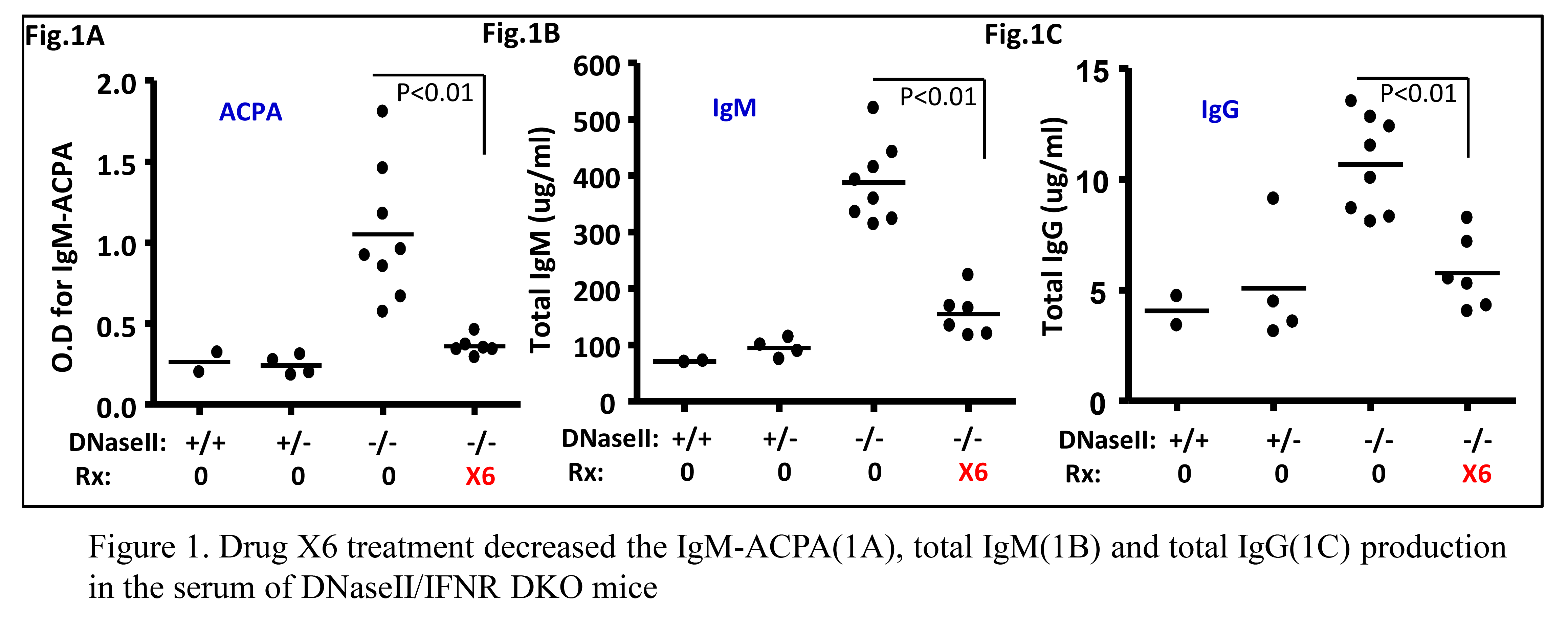Session Information
Session Type: ACR Poster Session A
Session Time: 9:00AM-11:00AM
Background/Purpose: Rheumatoid Arthritis (RA) is a highly prevalent autoimmune disease affecting ~1% of the world population and can lead to permanent joint damage and severe disability. Although current biologics improve disease, they do not cure or even lead to long-term remission. DNase II is an enzyme that degrades endosomal DNA. When DNaseII-/- mice are crossed to mice that lack the Type 1 Interferon Receptor (IFNAR) to create double knockouts (DKO), the DKO develop a rheumatoid arthritis (RA)-like disease including ACPA antibodies in the serum. The arthritis is dependent on activation of the cGAS-STING pathway, likely caused by leakage of DNA from the endosome into the cytosol. Since we synthesized a novel antimalarial like drug (X6) that was effective in the inhibition of cGAS in mice in vivo, we tested the effects of X6 on arthritis and serology in the DNaseII/IFNAR DKO mouse model of RA.
Methods: DNaseII DKO mice were treated orally with either Splenda alone or X6 in Splenda at 25mg/kg/day (n=6) from 2 to 6 months of age. Anti-Citrullinated Protein/Peptide Antibodies (ACPA) were quantified with ELISA kit (IMMUNOSCAN CCPlus kit from Euro Diagnostica), except that Alkaline Phosphatase-conjugated goat antibody against mouse immunoglobulin (IgM) was used as the detection antibody. RF IgG/IgM and total IgG/IgM were quantified by in house ELISAs. Swelling of the forelimb and hindlimb joints was inspected manually and scored blindly. Cytokines in the synovial tissues were quantified by qPCR.
Results: ACPA is a highly specific and sensitive serologic biomarker of RA. There was increased IgM-ACPA expression in IFNR-/-/DNaseII-/- (DKO) mice compared to IFNR-/-/DNaseII+/+ (WT) and IFNR-/-/DNaseII-/+ (Het) mice (Fig.1A). X6 treatment statistically significantly reduced IgM-ACPA compared to untreated controls (p<0.01, Fig.1A). X6 treatment reduced IgM-RF although these values did not reach statistical significance. Total IgM and IgG were significantly elevated in DKO mice compared to DNaseII WT and Het mice (Fig.1B and 1C). X6 treatment statistically significantly decreased total IgM (p<0.01, Fig.1B) and total IgG (p<0.01, Fig.1C) compared to untreated controls Tumor Necrosis Factor (TNF) is the key cytokine implicated in the pathogenesis of arthritis in DKO mice. X6 treatment reduced mRNA expression of TNF although reduction did not reach statistical significance. Clinically, X6 treatment did not significantly reduce the arthritis score and joint thickness.
Conclusion: Our studies demonstrate that X6 was highly effective in reducing the elevated arthritis-relevant serology that includes ACPA and total immunoglobulins. While clinical arthritis did not change significantly at 25 mg/kg/day, higher drug doses may be beneficial. Differential impact of X6 on the cGAS-STING versus the TLR pathways may also be relevant for future exploration.
To cite this abstract in AMA style:
An J, Madarampalli B, Sun X, Tanaka L, Noss EH, Woodward J, Sasaki T, Elkon KB. Novel Anti-Malarial Drug Derivative Inhibited Anti-Citrullinated Protein/Peptide Antibodies and Rheumatoid Factors Production in Dnaseii/Ifnr Double Knock out Mice [abstract]. Arthritis Rheumatol. 2018; 70 (suppl 9). https://acrabstracts.org/abstract/novel-anti-malarial-drug-derivative-inhibited-anti-citrullinated-protein-peptide-antibodies-and-rheumatoid-factors-production-in-dnaseii-ifnr-double-knock-out-mice/. Accessed .« Back to 2018 ACR/ARHP Annual Meeting
ACR Meeting Abstracts - https://acrabstracts.org/abstract/novel-anti-malarial-drug-derivative-inhibited-anti-citrullinated-protein-peptide-antibodies-and-rheumatoid-factors-production-in-dnaseii-ifnr-double-knock-out-mice/

